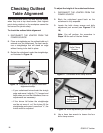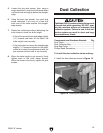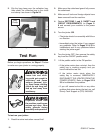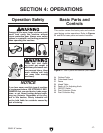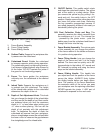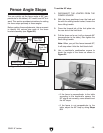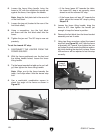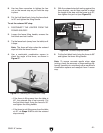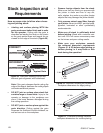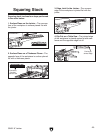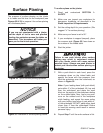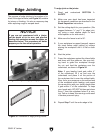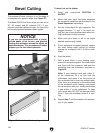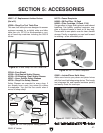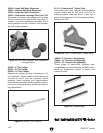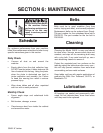
-22-
G0612 6" Jointer
Here are some rules to follow when choos-
ing and jointing stock:
• Jointing and surface planing WITH the
grain produces a better finish and is safer
for the operator. Cutting with the grain is
described as feeding the stock on the jointer
so the grain points down and toward you as
viewed on the edge of the stock (Figure
29
).
Figure 29
.
Illustration showing correct and
incorrect grain alignment with cutterhead.
Stock Inspection and
Requirements
• Remove foreign objects from the stock.
Make sure that any stock you process with
the jointer is clean and free of any dirt,
nails, staples, tiny rocks or any other foreign
objects that may damage the jointer blades.
• Only process natural wood fiber through
your jointer. Never joint MDF, particle board,
plywood, laminates or other synthetically
made materials.
• Make sure all stock is sufficiently dried
before jointing. Wood with a moisture con
-
tent over 20% will cause unnecessary wear
on the knives and poor cutting results.
• Make sure your workpiece exceeds
the minimum dimension requirements
(Figures 31 & 30) before edge jointing or
surface planing, or it may break or kick
back during the operation!
Figure 30. Illustration showing the minimum
workpiece dimensions for edge jointing.
Figure 31. Illustration showing minimum
workpiece dimensions for surface planing.
1
⁄2" Min.
1
⁄2" Min.
1" Min.
1" Min.
10" Min.
10" Min.
Note: If the grain changes direction along the
edge of the board, decrease the cutting
depth
and make additional passes.
• DO NOT joint or surface plane stock that
contains large or loose knots. Injury to the
operator or damage to the workpiece can
occur if the knots become dislodged during
the cutting operation.
• DO NOT joint or surface plane against the
grain direction. Cutting against the grain
increases the likelihood of stock kickback, as
well as tear-out on the workpiece.



